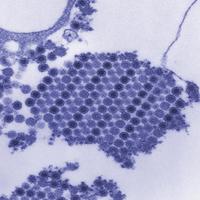 |
| Chikungunya virus particles--Courtesy of NIAID |
No specific treatment or vaccine currently exists for the mosquito-borne Chikungunya virus, but efforts are underway to remedy that. The NIH's National Institute of Allergy and Infectious Diseases (NIAID) will bring its experimental vaccine into Phase II, keeping up with Austria's Themis, which raised $7.9 million to do the same for its candidate last May.
The NIAID initially tested the vaccine in 25 people, all of whom developed strong immune responses. The new trial will involve 400 adults aged 18 to 60 and will take place at 6 sites in the Caribbean, one of the many regions where Chikungunya cases have been reported, the NIAID said in a statement. The participants will be divided into two groups, one of which will receive two doses of the candidate 28 days apart, while the other will receive two doses of placebo 28 days apart.
The vaccine uses viruslike particles (VLPs) instead of inactivated or weakened viruses, the NIAID said.
While the initial joint pain and fever in Chikungunya cases usually abates within a week, the joint pain may persist for months in some people, according to the Centers for Disease Control and Prevention. Since being discovered in the Americas in 2013, more than 1.7 million suspected cases have been reported in 45 countries or territories in the region, the CDC reports.
 |
| NIAID Director Dr. Anthony Fauci |
The most effective way to prevent Chikungunya infection is to prevent mosquito bites. And as there is no specific treatment once a person is infected, a vaccine represents the best hope of controlling the infection.
"The recent re-emergence of Chikungunya virus in this hemisphere has rapidly become a significant health burden," Dr. Anthony Fauci, NIAID director, said in the statement. "Our Chikungunya vaccine development efforts are part of a broader research effort to prevent, diagnose, treat and ultimately control this painful illness, which can strike anyone unlucky enough to be bitten by an infected mosquito."
- here's the release